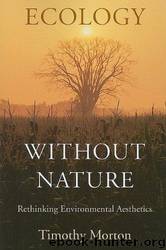Ecology Without Nature: Rethinking Environmental Aesthetics by Timothy Morton

Author:Timothy Morton [Morton, Timothy]
Language: eng
Format: epub
ISBN: 9780674034853
Publisher: Harvard University Press
Published: 2011-03-02T23:00:00+00:00
CHAPTER THREE
Imagining Ecology without Nature
I am here, sitting by the fire, wearing a dressing gown, holding this page in my hand.
— DESCARTES, MEDITATIONS
Chapter 2 could leave us in a state of cynicism. On some days, environmentalist writing seems like patching up the void with duct tape. So many solutions seem either out of date or inadequate in their attempt to generate different ways of making us feel about the state we are in, without changing it. But all cultural forms lag behind processes of production. Environmental art and politics are no exception. Moreover, certain radical or avant-garde practices have come more up to date with the current moment. The Paris Communes were experiments in the production of social space, documented by poets such as Rimbaud. The revolutionary space mobilized the floating world of the flaneurs and their psychic disposition of boredom, opening up desires for Utopian "free space" that sounds much like the wilderness.1 The Situationists in 1960s Paris and other experimenters in "psychic geography" have struggled to keep abreast of the productive forces.
Remaining in cynicism is a habit of the beautiful soul. Our choice is false if it has been reduced to one between hypocrisy and cynicism, between wholeheartedly getting into environmental rhetoric and cynically distancing ourselves from it. In both cases, we would be writing liturgies for the beautiful soul. Although it is "realistic" to be cynical rather than hypocritical, we do not wish to reinforce the current state of affairs. Our answer to the ruthless ransacking of nature, and of the idea of nature, must be yes, we admit to the reality of the situation. And no, we refuse to submit to it.
Instead of serving up lashings of guilt and redemption, might ecological criticism not engage the ideological forms of the environment, from capitalist imagery to the very ecocriticism that opposes capitalism? Ecocritique could establish collective forms of identity that included other species and their worlds, real and possible. It would subvert fixating images of "world" that inhibit humans from grasping their place in an already historical nature. Subverting fixation is the radical goal of the Romantic wish to explore the shadow lands. The hesitations of a Wordsworth, the unreliable narrators of a Mary Shelley—the whole panoply of irony and linguistic play is not marginal, but: central to Romanticism. Subversion of identity fixations is what Alain Badiou calls a truth process, a rigorous and relentless distinction of the subject from its identifications.2 It is valid both to say that subjectivity is profoundly Romantic, and to claim that we haven't attained it yet. indeed, an ecological collective to come would definitely not look like the nature-nation construct with its fascist-tending ideal of work and wholeness. It would be more like Jean-Luc Nancy's society of "unworking," and in this sense, the "unintention" and openness of ambient art hold out a promise of an almost unimaginable kind of being together.3
The environment was born at exactly the moment when it became a problem. The word environment still haunts us, because in
Download
This site does not store any files on its server. We only index and link to content provided by other sites. Please contact the content providers to delete copyright contents if any and email us, we'll remove relevant links or contents immediately.
Sapiens: A Brief History of Humankind by Yuval Noah Harari(14358)
The Tidewater Tales by John Barth(12648)
Mastermind: How to Think Like Sherlock Holmes by Maria Konnikova(7313)
Do No Harm Stories of Life, Death and Brain Surgery by Henry Marsh(6931)
The Thirst by Nesbo Jo(6924)
Why We Sleep: Unlocking the Power of Sleep and Dreams by Matthew Walker(6694)
Life 3.0: Being Human in the Age of Artificial Intelligence by Tegmark Max(5541)
Sapiens by Yuval Noah Harari(5363)
The Body: A Guide for Occupants by Bill Bryson(5077)
The Longevity Diet by Valter Longo(5057)
The Rules Do Not Apply by Ariel Levy(4955)
The Immortal Life of Henrietta Lacks by Rebecca Skloot(4571)
Animal Frequency by Melissa Alvarez(4459)
Why We Sleep by Matthew Walker(4432)
The Hacking of the American Mind by Robert H. Lustig(4369)
Yoga Anatomy by Kaminoff Leslie(4355)
All Creatures Great and Small by James Herriot(4306)
Double Down (Diary of a Wimpy Kid Book 11) by Jeff Kinney(4257)
Embedded Programming with Modern C++ Cookbook by Igor Viarheichyk(4170)
